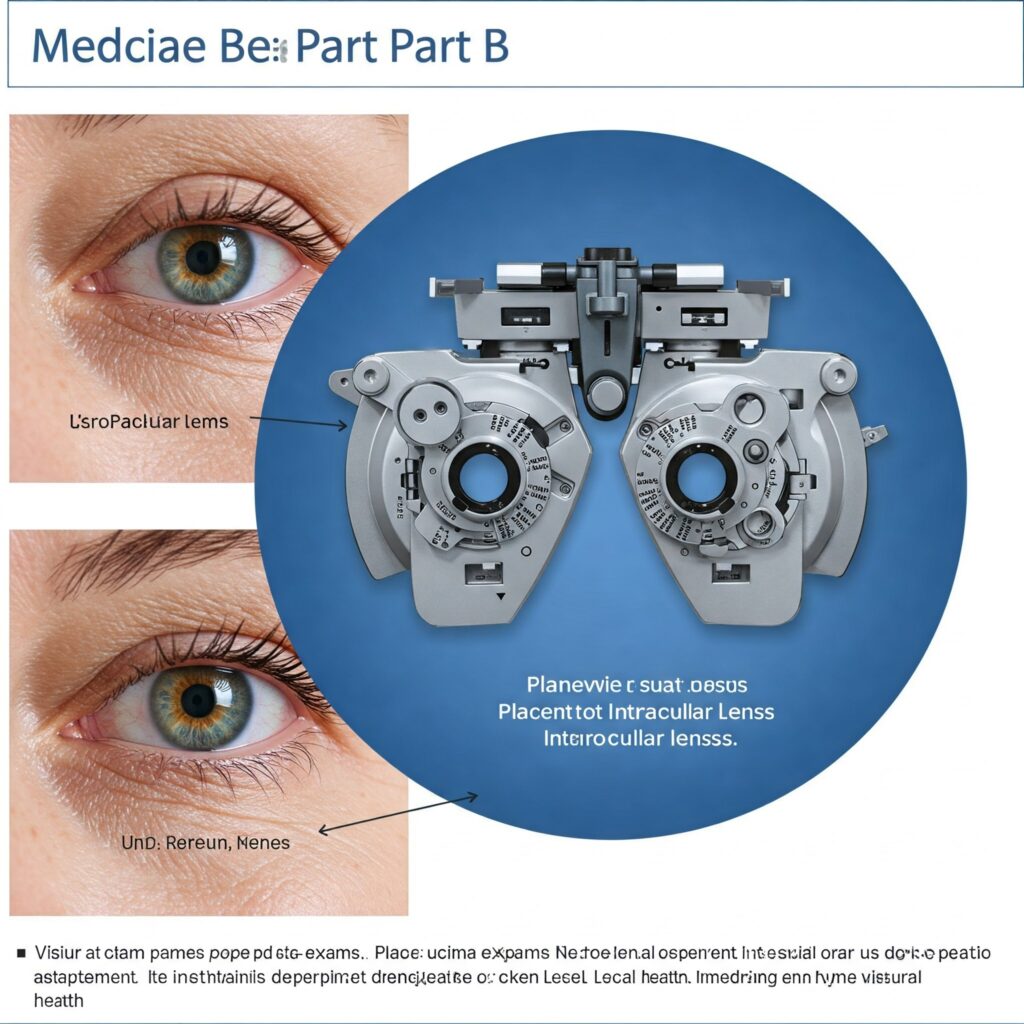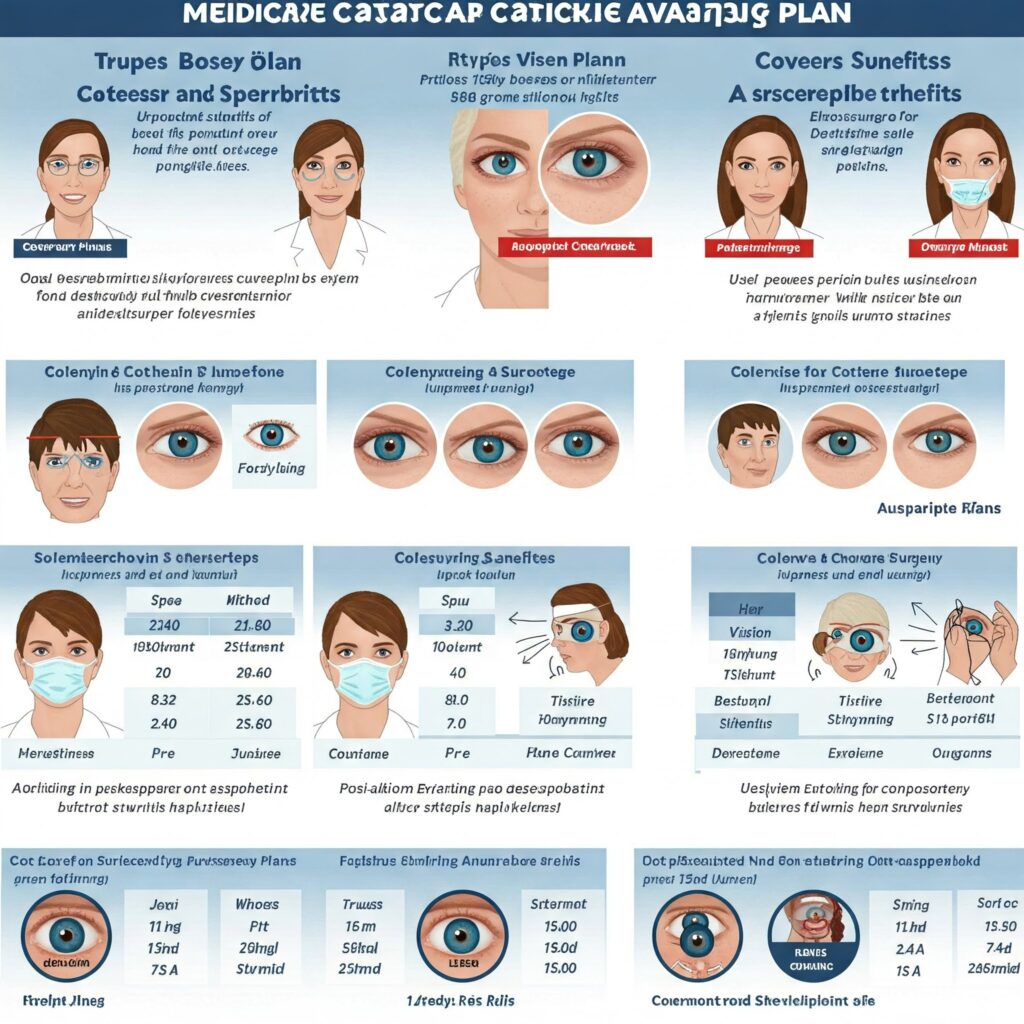Cataracts are a common age-related eye condition that can significantly impact your vision, making daily tasks like reading, driving, or even recognizing faces challenging. If you or a loved one is facing cataract surgery, one of the first questions that comes to mind is likely,
Does Medicare cover cataract surgery? Understanding how Medicare works with this procedure can alleviate financial stress and help you plan effectively. We’ll dive into seven vital facts to answer the question, Does Medicare cover cataract surgery?, and provide clarity on what to expect.

Medicare Part B Covers Cataract Surgery
The good news is that, in most cases, Does Medicare Cover Cataract Surgery. Specifically, Medicare Part B, which handles outpatient medical services, classifies cataract surgery as a medically necessary procedure. This means that if your doctor determines that cataracts are impairing your vision to the point where surgery is required, Medicare Part B will typically cover the procedure.
However, there are some important details to understand:
- What’s Covered: Medicare Part B covers the surgical procedure itself, including the removal of the cataract and the placement of a standard intraocular lens (IOL). It also includes pre-surgery exams, anesthesia, and follow-up care related to the surgery.
- Out-of-Pocket Costs: Medicare Part B covers 80% of the Medicare-approved amount for the surgery after you meet the annual deductible ($240 in 2025). You’ll be responsible for the remaining 20% coinsurance, which can vary depending on the provider and location.
- Facility Fees: If the surgery is performed in an outpatient surgical center or hospital, Medicare Part B also covers facility fees, but you may face additional coinsurance or copayments.
To ensure that The question ( Does Medicare Cover Cataract Surgery) Medicare covers cataract surgery in your case, confirm with your ophthalmologist that the procedure is deemed medically necessary and that the provider accepts Medicare assignment.

Medicare Does Not Cover Premium Lenses
While ( Does Medicare Cover Cataract Surgery) Medicare covers cataract surgery with a standard monofocal intraocular lens, it does not cover premium lenses or elective upgrades. Premium lenses, such as multifocal or toric lenses, are designed to correct additional vision issues like presbyopia or astigmatism, reducing the need for glasses post-surgery. These are considered elective, not medically necessary, so Medicare won’t foot the bill.
Here’s what you need to know:
- Standard vs. Premium Lenses: The standard monofocal lens covered by Medicare corrects vision at one distance (usually far). If you opt for a premium lens, you’ll need to pay the difference out of pocket, which can range from $1,000 to $4,000 per eye.
- Additional Costs: Some providers may charge extra for advanced diagnostic tests or laser-assisted cataract surgery, which Medicare may not cover unless deemed medically necessary.
- Discuss with Your Doctor: Before surgery, ask your ophthalmologist about lens options and whether Medicare covers cataract surgery (Does Medicare Cover Cataract Surgery) with any additional upgrades you’re considering. This can help you avoid unexpected costs.
If you’re hoping for premium lenses, check if you have supplemental insurance (like Medigap) or a Medicare Advantage plan that might offer partial coverage for these upgrades.
Native AsyncMedicare Advantage Plans May Offer Different Coverage
If you’re enrolled in a Medicare Advantage plan (Part C) instead of Original Medicare (Parts A and B), the answer to Does Medicare cover cataract surgery? depends on your specific plan. Medicare Advantage plans are offered by private insurers approved by Medicare, and they must cover at least the same benefits as Original Medicare. However, the details can vary.
Key points to consider:
- Coverage Variations: Most Medicare Advantage plans cover cataract surgery under similar terms to Medicare Part B, but copayments, coinsurance, and deductibles may differ. Some plans may also offer additional vision benefits, like coverage for glasses or contact lenses post-surgery.
- Network Restrictions: (Does Medicare Cover Cataract Surgery) Medicare Advantage plans often require you to use in-network providers. If you choose an out-of-network surgeon, your costs could be higher, or the procedure might not be covered at all.
- Prior Authorization: Some plans require prior authorization for cataract surgery, meaning you’ll need approval from the plan before proceeding.
To confirm whether Medicare covers cataract surgery under your Medicare Advantage plan, contact your plan provider and ask for a detailed explanation of coverage, including any out-of-pocket costs or network requirements.

Pre- and Post-Surgery Care Is Generally Covered
Another vital fact about Medicare covering cataract surgery ( Does Medicare Cover Cataract Surgery) is that it includes more than just the procedure itself. Medicare Part B typically covers pre-surgery consultations, diagnostic tests, and post-surgery follow-up care, as long as they’re deemed medically necessary.
Here’s a breakdown:
- Pre-Surgery Care: This includes eye exams to diagnose cataracts, measurements for the intraocular lens, and other tests to prepare for surgery. Medicare Part B covers these as long as they’re performed by a Medicare-approved provider.
- Post-Surgery Care: Follow-up visits to monitor healing and check vision are also covered. However, routine eye exams unrelated to the surgery (e.g., for glasses prescriptions) may not be covered unless you have additional vision coverage.
- Medications: Medicare Part B does not cover prescription eye drops or medications post-surgery, but you may be able to use Medicare Part D (prescription drug coverage) for these costs.
To maximize your benefits, ensure all pre- and post-surgery care is performed by providers who accept Medicare. This helps confirm that Medicare covers cataract surgery (Does Medicare Cover Cataract Surgery) and related services without unexpected expenses.
Medicare Covers Only One Pair of Glasses Post-Surgery
A common question tied to Does Medicare cover cataract surgery? is whether Medicare covers glasses or contact lenses after the procedure. The answer is yes, but with limitations. Medicare Part B covers one pair of corrective glasses or contact lenses after cataract surgery, as long as the surgery involved the implantation of an intraocular lens.
Details to know:
- What’s Covered: Medicare covers standard frames and lenses for one pair of glasses or a set of contact lenses. The coverage is limited to the Medicare-approved amount, and you’ll pay 20% coinsurance plus any costs above the approved amount.
- Timing: You must purchase the glasses or contacts from a Medicare-approved supplier after the surgery.
- Additional Vision Needs: If you need additional glasses, contact lenses, or routine vision exams, Medicare Part B typically does not cover these unless you have a Medicare Advantage plan with vision benefits.
If you’re concerned about vision costs post-surgery, explore whether a Medicare Advantage plan or supplemental vision insurance can help cover expenses beyond what Medicare covers for cataract surgery (Does Medicare Cover Cataract Surgery) .
Native AsyncLocation and Provider Choice Impact Costs
Even though Medicare covers cataract surgery (Does Medicare Cover Cataract Surgery) , your out-of-pocket costs can vary depending on where the surgery is performed and whether your provider accepts Medicare assignment. Here’s how these factors play a role:
- Facility Type: Cataract surgery is typically performed in an outpatient surgical center, which is often less expensive than a hospital outpatient department. Medicare Part B covers both, but hospital settings may have higher facility fees, increasing your coinsurance.
- Medicare Assignment: Providers who accept Medicare assignment agree to charge the Medicare-approved amount, limiting your out-of-pocket costs. If your provider doesn’t accept assignment, they can charge up to 15% more (known as the limiting charge), which you’ll need to pay.
- Geographic Location: Costs for cataract surgery can vary by region due to differences in provider fees and facility charges.
To minimize costs, ask your surgeon if they accept Medicare assignment and whether the procedure will be performed in a surgical center or hospital. This ensures you get the most out of Medicare covering cataract surgery (Does Medicare Cover Cataract Surgery).
Supplemental Insurance Can Reduce Out-of-Pocket Costs
For many beneficiaries, the 20% coinsurance and deductible associated with Medicare covering cataract surgery can still be a financial burden. This is where supplemental insurance, such as Medigap or employer-sponsored retiree plans, can make a big difference.
What you need to know:
- Medigap Plans: Medigap policies (sold by private insurers) help cover Medicare Part B coinsurance, deductibles, and sometimes excess charges from non-assigned providers. Depending on the plan, Medigap could cover most or all of your out-of-pocket costs for cataract surgery.
- Medicare Advantage: As mentioned earlier, some Medicare Advantage plans offer lower copayments or additional vision benefits, which could reduce your costs compared to Original Medicare.
- Other Insurance: If you have retiree health benefits or Medicaid, these may cover additional costs, such as premium lenses or medications.
Before scheduling surgery, review your insurance options to see how they complement Medicare’s coverage for cataract surgery (Does Medicare Cover Cataract Surgery). Contact your Medigap or Medicare Advantage provider for details on what’s covered.

Understanding Medicare’s Coverage for Cataract Surgery
Navigating the question Does Medicare cover cataract surgery? can feel overwhelming, but the seven vital facts outlined above provide a clear roadmap. Medicare Part B generally covers cataract surgery as a medically necessary procedure, including pre- and post-surgery care and one pair of glasses afterward. However, premium lenses, elective upgrades, and certain additional costs may not be covered, and your out-of-pocket expenses can vary based on your provider, facility, and insurance.
To make the most of Medicare’s coverage for cataract surgery, take these steps:
- Confirm with your ophthalmologist that the surgery is medically necessary.
- Verify that your provider and facility accept Medicare assignment.
- Review your Medicare Advantage or Medigap plan for additional coverage.
- Ask about lens options and any out-of-pocket costs upfront.
By understanding these details, you can approach cataract surgery with confidence, knowing what to expect financially and how Medicare covers cataract surgery. If you have further questions, consult your healthcare provider or contact Medicare directly at 1-800-MEDICARE for personalized guidance.
What type of lens does Medicare cover for cataract surgery?
Medicare covers a standard monofocal intraocular lens (IOL) for cataract surgery.
Cost of cataract surgery with Medicare Advantage?
Costs vary by plan, but Medicare Advantage typically covers cataract surgery with copayments or coinsurance, often similar to Original Medicare’s 20% after the deductible. Check your plan for specifics
Does Medicare pay for cataract surgery with astigmatism?
Medicare covers cataract surgery but does not cover premium toric lenses to correct astigmatism. You’ll pay out-of-pocket for those.
Does Medicare cover cataract surgery and lens implant?
Yes, Medicare Part B covers cataract surgery and a standard monofocal lens implant.
Does Medicare cover cataract surgery in 2025?
Yes, Medicare Part B covers medically necessary cataract surgery in 2025
What type of cataract surgery does Medicare not pay for?
Medicare does not cover elective upgrades like premium lenses (multifocal or toric) or laser-assisted surgery unless medically necessary.
Does Medicare Part B cover cataract surgery?
Yes, Medicare Part B covers medically necessary cataract surgery.
Does Medicaid cover cataract surgery?
Medicaid coverage for cataract surgery varies by state but often covers it if deemed medically necessary. Check with your state’s Medicaid program.
